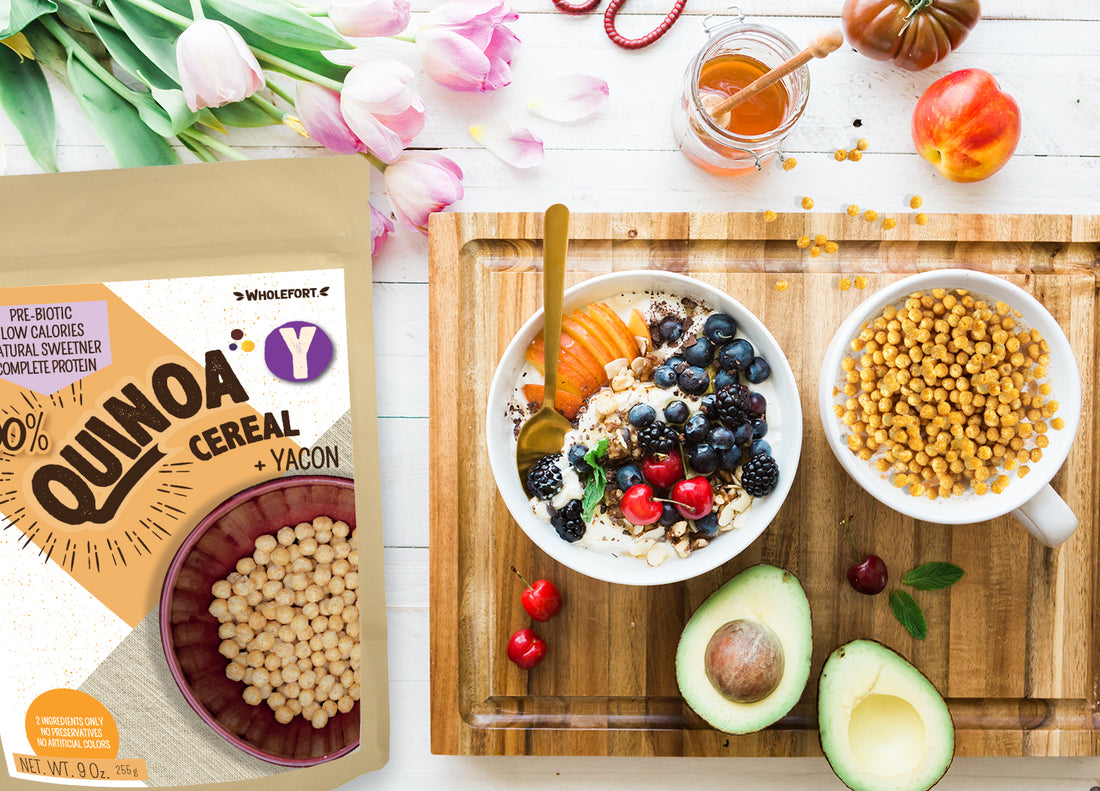Dietary fiber is a term not always used properly, fiber and dietary fiber are often used interchangeably and they should not, in a previous post we discussed the basics, explaining that dietary fiber is made up of insoluble and soluble fiber.
The aim of this post is to elaborate more in dietary fiber, why it is so important in supporting health and even more on what makes Yacon’s fructooligosaccharides (FOS) the best naturally sourced fiber out there.
Classification of dietary fiber:
Scientific literature suggests several different classification systems to determine the components of dietary fiber: based on the food source, based on the type of chemical structure or based on their gastrointestinal fermentability (digestion), being the latter from a nutritional standpoint the best to asses fiber’s physiological role in our bodies.
Therefore dietary fiber is classified into two categories:
+Insoluble/less or none fermentable
+Soluble/very or partially fermentable
Here are some examples of foods with dietary fiber:

How did they work in our body?
- Insoluble fiber adds bulk to the formation of the stool by absorbing more water, and it also creates a jelly-like substance in our gut walls for optimal intestinal health.
- On the other hand, soluble fiber is everything that is fermented by our microbiome (gut bacteria), and yes, Yacon´s FOS is soluble fiber. These undigestible sugars are contained in high amounts in Yacon, in fact, FOS is the best soluble fiber of any other substances classified as soluble fiber like pectin, inulin, gums, and mucilage.
Solid scientific studies show (1) that FOS exhibits the best bioactivity in a jaw-dropping 55 different strains of beneficial bacteria in the human gut, whereas other substances like inulin failed to be fermented by most of the bacteria strains.
¿Prebiotic or soluble fiber?
Soluble fibers act as a prebiotic, in fact, they are synonyms; this means that soluble fiber promotes a proliferation or reproduction of good bacteria in our guts. That is the definition of prebiotic.
FOS intake stimulates the proliferation of bifidobacteria, a group of beneficial bacteria.
SCFA (Short-chain fatty acids) can also favor the growth of health-promoting bacteria such as Bifidobacterium and Lactobacillus while reducing or maintaining pathogenic populations (e.g, Clostridium and Escherichia Coli) (2).
FOS, more than a prebiotic.
According to clinical trials (3) FOS intake not only favors the growth of health-promoting bacteria while reducing pathogenic bacteria populations. Moreover, the end products of FOS fermentation by the intestinal microbiota, short-chain fatty acids (SCFA), act as substrates or signaling molecules in the regulation of glucose homeostasis and lipid metabolism.
Take away message
It has been established that overweight and obesity are related not only to diet but to gut microbiota (4) SCFA´s, which are produced after FOS intake, have beneficial effects not only on gut health but general metabolism.
Our nutritional recommendation is to incorporate Quinoa cereal with Yacon to your regular diet.
Consumption in the mornings seems to work best for gut nourishment, but any time of the day should suffice to promote good bacteria growth.
With Yacon aid, a balanced diet and regular exercise, we have the perfect strategy for weight loss and weight control.

Written by Antonio Reyes, RD.
References
-
Rossi M, Corradini C, Amaretti A, Nicolini M, Pompei A, Zanoni S, et al. Fermentation of fructooligosaccharides and inulin by bifidobacteria: a comparative study of pure and fecal cultures. Appl Environ Microbiol. (2005).
-
Sun, Y.; O’Riordan, M.X.D. Regulation of Bacterial Pathogenesis by Intestinal Short-Chain Fatty Acids. Adv. Appl. Microbiol. (2013).
-
Genta S, et al. Yacon syrup: beneficial effects on obesity and insulin resistance in humans. Clin Nutr. (2009).
-
Bourlioux, P.; Koletzko, B.; Guarner, F.; Braesco, V. The intestine and its microflora are partners for the protection of the host: Report on the Danone Symposium “The Intelligent Intestine”, held in Paris, June 14, 2002. Am. J. Clin. Nutr. (2003).

